Abdullah Bozkurt/Stockholm
Turkey’s facilitation of an asylum scam for migrants willing to pay top money for illegal transfer to Europe via private jets has been exposed in a rare civil dispute when an aviation company sought damages for fraud.
The company, unidentified in the case file of the Supreme Court of Appeals, filed a criminal complaint alleging a sophisticated scam involving forged diplomatic passports, a private jet chartered from Istanbul and a group of passengers who later sought asylum in Italy.
The incident, which occurred in 2021, involved nine Iraqi asylum seekers flown from Istanbul to Italy under the pretense of being a foreign diplomatic delegation. The operation should have triggered multiple red flags, ranging from the booking of the aircraft to clearance at customs and immigration. Yet the traffickers had no problem leaving Turkey, thanks to what appears to have been a deeply corrupt scheme implicating members of the judiciary and law enforcement who were allegedly bribed to look the other way.
According to the aviation company, a company acting on behalf of nine individuals with purported diplomatic passports from the Caribbean state of Saint Kitts and Nevis requested a private jet for a meeting in Italy. After allegedly verifying the passports, the company chartered an aircraft from another operator to fly the group from Istanbul to Italy for a fee of $43,000, paying $35,000 up front to the charter provider.
The suspects then sent the company a forged SWIFT payment confirmation, claiming the money had been wired. Convinced, the company cleared the flight. Only later did it discover that no payment had been made, leaving the company with both the loss of the upfront charter payment and its anticipated profit.
A ruling by the Supreme Court of Appeals has reopened a high-profile fraud case involving human smugglers who transported asylum seekers to Italy on a private jet:
The company’s lawyers filed a criminal complaint with the Istanbul Public Prosecutor’s Office, which in August 2022 surprisingly declined to prosecute. Prosecutors claimed that the offense had been committed in Italy, outside Turkish jurisdiction, and that the suspects’ identities and addresses could not be determined, ignoring both Turkish precedent and international protocols. Turkish investigators could easily have sought cooperation from Italy under mutual legal assistance treaties to obtain the identities of the migrants and traffickers. Instead, they chose not to pursue the case, a decision widely interpreted as a deliberate attempt to shield Turkish officials who were complicit in the scheme.
In December 2022 the Istanbul 9th Criminal Court of Peace rejected the company’s objection, effectively killing any domestic legal avenue for the aviation firm to seek remedy.
Meanwhile, Turkish traffickers continued using the same private jet scam to move more migrants to Europe, drawing the attention of European law enforcement. In September 2022 Italian police announced a major bust of a trafficking network that used private jets to smuggle migrants into Europe. The operation, coordinated by Italy, Germany, France, Austria and Belgium with support from the US, Europol and Eurojust, resulted in the arrest of five suspects in Italy and Belgium. According to Italian authorities traffickers charged $10,000 per migrant, relied on forged diplomatic passports from Saint Kitts and Nevis and disguised flights as trips bound for the Caribbean, making a stopover in Europe where the passengers disembarked and sought asylum.
Strikingly, the announcement made no mention of Turkey, even though the entire scheme originated there. Nor was there any reference to cooperation with Turkish authorities. European investigators were well aware that such an operation could not function without the complicity of Turkish officials.

The collapse of the case in Turkey confirmed suspicions among European law enforcement that Ankara was complicit. The issue soon became a point of tension between the government of President Recep Tayyip Erdogan and its European counterparts. Under mounting pressure, the Erdogan government sought to contain the fallout. On October 21, 2024, the Turkish Ministry of Justice petitioned the Office of the Chief Public Prosecutor of the Supreme Court of Appeals, asking to reopen the fraud case and void the lower court’s ruling.
A month later the chief public prosecutor sided with the Justice Ministry, formally requesting that the Supreme Court overturn the decision. The court noted that under Turkish law, fraud involving banking systems or information technologies is deemed to occur where the victim resides or suffers financial damage. Since the aviation company was based in Istanbul, and the financial loss occurred there, Turkish prosecutors did in fact have jurisdiction. The ruling cited previous case law and emphasized that “the crime of fraud is completed at the moment when the perpetrator withdraws the money,” underscoring that jurisdiction lies where the economic loss is realized. It also reminded prosecutors that Turkey’s Penal Code and Code of Criminal Procedure mandate active investigation whenever credible evidence of a crime exists, regardless of cross-border complications.
On May 26, 2025, a criminal chamber of the Supreme Court of Appeals ruled in favor of reopening the case, annulled the lower court’s decision and instructed prosecutors to proceed with an investigation.
Despite this dramatic legal reversal, little is expected to come from the reopened case. Many see it as a face-saving maneuver by the Erdogan government designed to ease European pressure rather than a genuine attempt to prosecute traffickers or expose officials who facilitated the scam. No heavy penalties are anticipated for those involved, nor is there any expectation that Turkish officials who aided or abetted the smugglers will be held accountable. Instead, the process is likely to be carefully managed to avoid political embarrassment while giving Ankara a talking point in negotiations with Europe.
This case highlights a murky intersection of organized fraud, human smuggling and the facilitative role of Turkish law enforcement. It underscores how powerful networks can operate with near-total impunity in Turkey, shielded by political cover and corruption. It also sheds light on the influence of Erdogan’s far-right coalition partner, the Nationalist Movement Party (MHP), whose entrenched presence in the police and judiciary helps protect such networks, mafia groups and organized crime syndicates.
In the end the case serves as yet another example of how corruption and political interference in Turkey’s justice system and law enforcement agencies enable transnational criminal schemes, leaving both victims and European partners frustrated.












